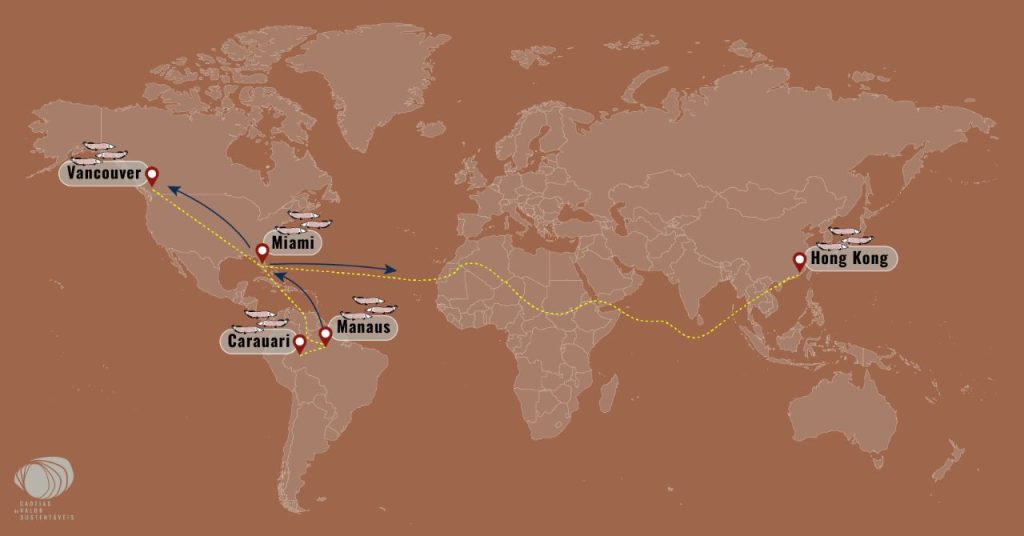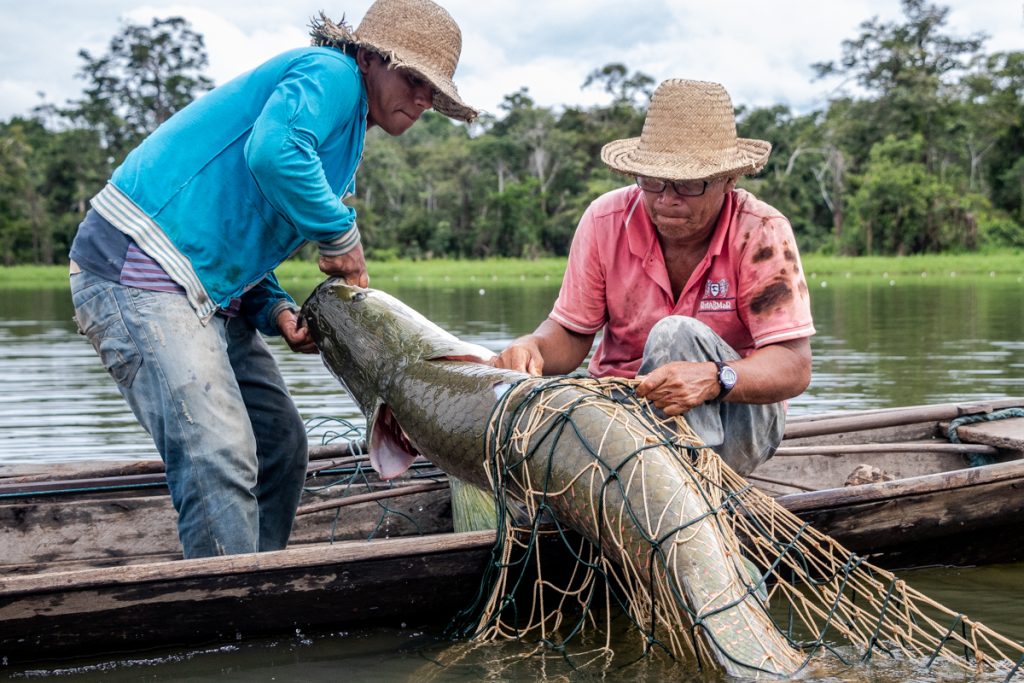Pirarucu from sustainable management of the Amazon aims to reach international market
[ad_1]
Manaus (AM) – Samples of arapaima, approximately 100 kilos of frozen product, arrived in Vancouver, Canada, and Hong Kong. These were the first international shipments of samples for gastronomy chefs and importers to get to know the product.
The initiative is part of the Fish of Change project, which provides for the consolidation of sustainably managed pirarucu in the domestic market and the opportunity to introduce a product loaded with social and ecological value into the international market.
The export of pirarucu appears as a great window of opportunity. The Association of Rural Producers of Carauari (Asproc) coordinates an innovative commercial arrangement between productive areas in different regions and becomes the first community-based organization to export fish. In this way, the pirarucu can become the great symbol of the Amazonian bioeconomy by aligning biodiversity conservation with the aspirations of local communities and market opportunities.
The project has several partnerships and strategic support from the United States Forest Service (USFS), within the technical cooperation between Brazil and the United States. “The Brazil program focuses on the conservation of biodiversity and people’s way of life, and this project represents these two pillars. We are also acting in the face of climate change, dialoguing with the private sector and protected areas”, explains Jayleen Vera, manager of the USFS program in Brazil.
Challenges
The challenges and the process for export are complex, the project needs to ensure a rigorous quality of the fish to other countries. The first international shipping experience enabled the creation of an air export protocol, which will guide future shipments of samples. It is expected that when reaching commercial orders on a larger scale, the means of transporting the product will be via a refrigerated container via the port to reduce logistical costs.
“We believe that this shipping stage is the heart of the project, which taught us the bureaucratic difficulties of an export and the complex steps involved in getting the necessary approvals for shipments,” says Simelvia Vida, Fishery Resources analyst at the Juruá Institute and responsible for articulating the Fish of Change initiative.
The idea is to expand the commercialization of pirarucu in Brazil, strengthen ties with the production bases, improve fish processing processes, improve processing infrastructure and commercial capacity.
“I have seen this initiative as an opportunity to make pirarucu handling better known. It is a chance to strengthen and consolidate this effort to improve the income of the managers, combined with environmental conservation and a more dignified life for the indigenous and riverside communities of the Amazon”,
says the adviser to the Association of Rural Producers of Carauarí (ASPROC) and president of the Chico Mendes Memorial (MCM), Adevaldo Dias.
Fish of Change addresses the main bottlenecks in pirarucu management, strengthening the domestic market and developing the main requirements of the foreign market with a focus on a high standard market that guarantees the payment of a fair price to the handlers.
Fairtrade Certification

Still within the scope of the initiative, Fairtrade certification is planned for two management areas, in the Paumari Indigenous Lands, in the municipality of Tapauá, and in communities in the Middle Juruá, in the municipality of Carauari, and for ASPROC, the organization that centralizes the commercial arrangement of the management wild pirarucu.
Fairtrade certification is a global seal that identifies products produced and sold in accordance with fair trade standards. This seal ensures that producers involved in the various stages of the value chain receive a fair price for their work and are guaranteed basic labor rights, such as the prohibition of child labor and forced labor.
In addition, Fairtrade certification also encourages sustainable production, promoting practices that protect the environment and biodiversity. Studies show that Fairtrade-labeled goods are in greater demand among conscientious consumers who are willing to pay a higher price for products that meet ethical and environmental standards.
According to João Campos-Silva, president of the Juruá Institute, inserting the seal in the product generates multiple benefits for those involved in the process.
“For Asproc it is important because it is a chance to place pirarucu in a more demanding market that pays more for the product, in addition, the Fairtrade seal attests to all the social and ecological value of management. In this way, it ends up being a showcase for the association’s products.”
According to Campos-Silva, for communities that carry out fishing, having the seal on the packaging is also very interesting. The Fairtrade seal has some financial benefit mechanisms, which in addition to generating more income from the sale of fish, requires a collective productive arrangement and delivers an annual award to participants for meeting the requirements.
“This award is a large resource that can be used to maintain this organizational structure of the arrangement. So, the seal greatly strengthens the arrangement, both by generating direct income and by increasing money for maintaining the organizational structure. We are working on the implementation challenges, but we have taken significant steps so that Asproc is the implementer of the seal”,
ensures.
There are also plans to create a new brand with its own visual identity to sell pirarucu on the international market.
“We see great potential for pirarucu to be consumed in the international market for two reasons: offering a new product to new markets and increasing biodiversity conservation with a specific product”,
highlights Jayleen.

For Adevaldo Dias, the partnership with the USFS is essential for building the path to export, which in addition to having high costs, presents bureaucratic and logistical challenges. “The support of the USFS enables new learning. We are experiencing something new for all partners: OPAN, Instituto Juruá, MCM, Asproc and the USFS itself. This will allow us to apply this knowledge to the export of other extractive products.”
Historic
USFS’s work for the sustainable development of the wild arapaima management chain began in 2015 in collaboration with several organizations that have been working on this agenda for decades. Over the years, efforts have been invested in training managers and tools for monitoring, tracking and certifying production, improving sanitary aspects, logistics and chain transport, opening up the market, among other actions.
One of the initiatives that emerged during the Sustainable Value Chains project was the Coletivo do Pirarucu, a network of leaders and organizations representing approximately 4,000 indigenous fishermen and riverine pirarucu handlers from the Negro, Solimões, Juruá and Purus river basins in the Amazon. .
To consolidate the pirarucu chain of sustainable management and promote sales in new markets outside the Amazon, the project also supported the creation of the collective brand Gosto da Amazônia, also managed by ASPROC, which expanded the sale of fish to new consumer markets.
With the preservation of the pirarucu and the conservation of biodiversity, management brings several other benefits. Such as increasing income and strengthening the social organization of communities, promoting the reduction of social inequalities, increasing food security and promoting a significant improvement in the quality of life of indigenous peoples and traditional populations, in addition to providing greater protagonism for women in the activity fishing.
“This project is a great example of the impact of the work carried out with several partnerships, between social organizations, government, community-based associations and private power. It was possible to build a relationship, a common understanding”,
scores Jayleen Vera.
The Fish of Change initiative has the following partnerships: Operation Amazônia Nativa (OPAN), which leads the arrangement, Instituto Juruá, ASPROC, Memorial Chico Mendes (MCM), Instituto de Desenvolvimento Sustentável Mamirauá (IDSM), the BlueYou group and SindRio.
*With advisory information
Read more:
Tambaqui of sustainable origin is sold from R$ 10 at the headquarters of FAS, in Manaus
Chef teaches recipe for ‘coconut milk fish with vegetables and chestnut rice’
In Amazonas, companies start to adhere to the use of shorts at work due to excessive heat
[ad_2]
Source link




:strip_icc()/s02.video.glbimg.com/x720/12519489.jpg)

